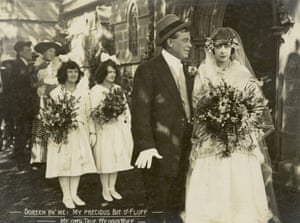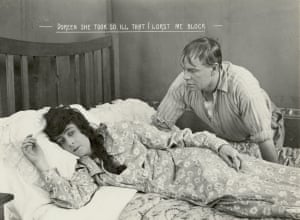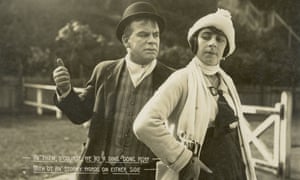Extract from The Guardian
This month marks 100 years since the movie first screened. Luke Buckmaster reflects on a film he believes is still one of Australia’s best
Since cinema’s earliest years, people have debated the extent to
which motion pictures should resemble other art forms such as theatre,
literature and paintings. It is rare for a film to reflect elements of
all three of these mediums as exquisitely as the director Raymond
Longford’s The Sentimental Bloke, which is widely considered the pièce
de résistance of Australian feature film-making from the silent era.
This extraordinary production’s reputation is deserved, though the claim that it represents the peak of film-making in this country during that period is complicated by the tragic fact that the vast majority of silent Australian films have been lost. Longford made his masterpiece with long-time collaborator and fellow pioneer Lottie Lyell, who was one of Australia’s first film stars and a hugely influential figure, obscured by history but far from forgotten.
The Sentimental Bloke opened to the public in 1919 but also screened in November the previous year – so this month is significant for Australian cinema, marking the film’s 100-year anniversary. Adapted from beloved poems by C.J. Dennis, it is set in Sydney’s working-class suburbs and follows a rough but sweet larrikin, Bill (Arthur Tauchert). He is inspired by a new love interest, Doreen (Lyell), to give up drinking, gambling and brawling for a family-centric life on the street and narrow.

This extraordinary production’s reputation is deserved, though the claim that it represents the peak of film-making in this country during that period is complicated by the tragic fact that the vast majority of silent Australian films have been lost. Longford made his masterpiece with long-time collaborator and fellow pioneer Lottie Lyell, who was one of Australia’s first film stars and a hugely influential figure, obscured by history but far from forgotten.
The Sentimental Bloke opened to the public in 1919 but also screened in November the previous year – so this month is significant for Australian cinema, marking the film’s 100-year anniversary. Adapted from beloved poems by C.J. Dennis, it is set in Sydney’s working-class suburbs and follows a rough but sweet larrikin, Bill (Arthur Tauchert). He is inspired by a new love interest, Doreen (Lyell), to give up drinking, gambling and brawling for a family-centric life on the street and narrow.

The actors don’t perform in the exaggerated style associated with silent pictures; there is actually much more flamboyance in the film’s dialogue than their delivery, which is presented in deeply memorable intertitles that lend a different kind of meaning to the term “visual poetry”.
Using Dennis’s prose, which was written in Australian slang, the intertitles in effect capture the protagonist talking to the audience in his, shall we say, native tongue. For example, when Bill – a self-confessed crook who’s “done me dash” – gets thrown in prison for playing two-up, an intertitle appears:
The world ‘as got me
Snouted just a treat,
Crool Forchin’s dirty left
‘as smote me soul;
An’ all them joys o’ life I
‘Eld so sweet
Is up the pole
I seen ‘er in the market
first uv all,
Inspectin’ brums at
Steeny Isaacs’ stall.
Having mustered the courage to make small talk, Bill is disappointed by Doreen’s unenthusiastic response (she’s far from a pushover), but later convinces her to date him. Their nights on the town include a trip to the theatre to see a Shakespeare play “about a barmy goat called Romeo”, and a trip to the beach.The Sentimental Bloke’s story is enormously warm-hearted and remarkable in its timelessness. Photograph: National Film and Sound Archive
He reflects on their tender moment on the sand:
‘Oldin’ in me ownSome of the language has dated, of course – including Bill’s fondness for describing the opposite sex as “tarts”, and one use of a racial slur to describe a time of the day (taken from Dennis’s poems). But the story is enormously warm-hearted and remarkable in its timelessness. And with its at-first-blush tough guy protagonist who turns out to be needy, sensitive and openly breaks down in tears, it explores Australian masculinity in a more interesting, meaningful way than the majority of films released today.
‘Er little ‘and,
An’ ‘ow she blushed! O, strike!
it was divine
The way she raised ‘er shinin’ eyes to mine

Could it be that when the film was screened live 100 years ago, a woman sang in the theatre – and the audience joined in for the chorus? What a wonderful moment of audience participation that would have been. A representative from the NFSA said it was a highly possible explanation – but perhaps we’ll never know. In the DVD audio commentary, historians Graham Shirley and Jeannette Delamoir shed no light on this scene beyond commenting that the song (The Curse of an Aching Heart) was popular at the time.
Voting for the Sentimental Bloke recently in a poll initiated by the Adelaide film festival to determine the greatest Australian films, the director George Miller described its appeal simply: “It will make you laugh, it will make you cry.” Those words might sound trite in another context but fittingly encapsulate this enduring, bittersweet film. One hundred years after it first screened, The Sentimental Bloke is still bloody bonzer, and it’s hard to imagine another romantic Australian movie ever eclipsing it.


No comments:
Post a Comment